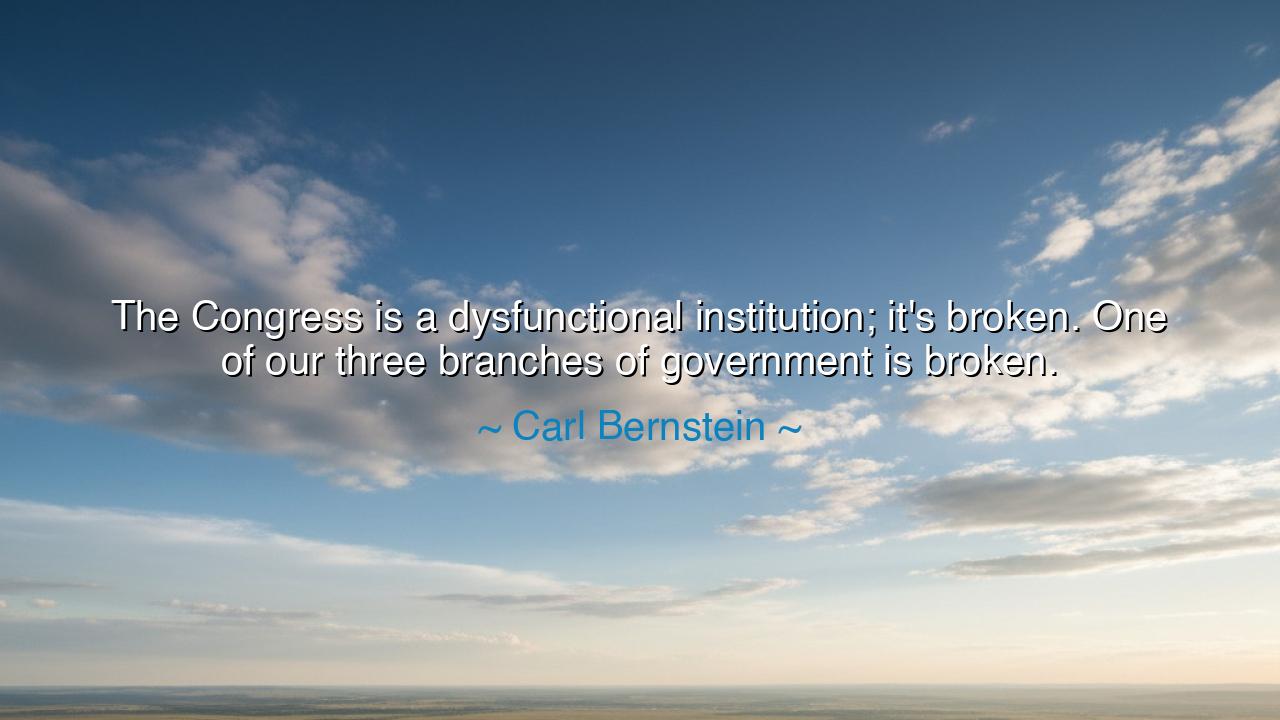
The Congress is a dysfunctional institution; it's broken. One of
The Congress is a dysfunctional institution; it's broken. One of our three branches of government is broken.






Hearken, children of truth and civic virtue, and ponder the words of Carl Bernstein, a man whose pen once unveiled the secrets of power and brought down a president. He declared with solemn voice: “The Congress is a dysfunctional institution; it's broken. One of our three branches of government is broken.” In this lament lies not a cry of despair alone, but a warning to all free peoples—that when the mechanisms of governance falter, the very structure of liberty trembles. Bernstein speaks not as a cynic, but as a guardian of democracy who has witnessed its fragility and its potential for decay.
Born from the crucible of the Watergate investigation, Bernstein’s understanding of government runs deep. He has seen how institutions meant to serve the people can drift from their purpose, ensnared in partisanship, self-interest, and paralysis. His words echo through the halls of history, calling to mind the ancient truth that power without principle corrupts, and that the machinery of state, however noble in design, can crumble when those entrusted with it cease to act with courage and integrity.
The Congress, as envisioned by the founders of the American Republic, was to be the beating heart of representative democracy—a chamber where reasoned debate, compromise, and collective will could shape the destiny of a nation. Yet Bernstein laments that this sacred vessel has become fractured. Too often, he saw leaders speaking not for the people, but for factions; legislating not for the common good, but for the preservation of their own influence. In this dysfunction lies a deeper moral illness: the erosion of trust between the governed and their governors.
History bears grim witness to such decline. In the waning years of the Roman Republic, the Senate, once the guardian of civic virtue, succumbed to greed and division. Public servants became private profiteers; deliberation gave way to demagoguery. The republic’s heart rotted long before the empire rose. Bernstein’s warning thus transcends his own age—it is the same peril that has haunted every democracy: when discourse turns to discord, and when institutions forget their duty to the people, freedom withers in silence.
Yet even in his lament, there glimmers a note of hope. To call something “broken” is not to declare it beyond repair. Bernstein’s words summon citizens to awaken, to reclaim their role as the true architects of government. The dysfunction of Congress is not an isolated failure—it is a mirror reflecting the apathy and division of the society it represents. The ancient philosophers taught that governance is but a reflection of the soul of a people. Thus, to heal the state, one must first restore virtue to the hearts of its citizens.
Consider the story of Abraham Lincoln, who stepped into government during one of America’s darkest hours, when the nation was torn asunder by war and moral conflict. Congress was crippled by division, and yet through steadfast faith, humility, and dialogue, Lincoln reminded his generation that government must be “of the people, by the people, for the people.” His leadership rekindled unity not by power alone, but by moral conviction. So too must every generation rediscover that same moral compass if institutions are to function again.
The lesson, therefore, is both clear and urgent: institutions cannot save themselves; only the people can. Citizens must demand accountability, reward integrity, and refuse the seduction of division. They must engage not as spectators but as stewards, for democracy is not a spectacle—it is a living covenant that demands participation and vigilance. When one branch falters, it is the duty of the others—and of the people—to restore its strength.
So let Bernstein’s words echo through the chambers of our conscience: when one branch of government breaks, the whole tree of liberty is at risk. But when citizens rise with courage, knowledge, and moral clarity, the fractures can be mended, and the republic renewed. For though the machinery of democracy may falter, the spirit of democracy—rooted in the hearts of free men and women—can always rise again.






AAdministratorAdministrator
Welcome, honored guests. Please leave a comment, we will respond soon